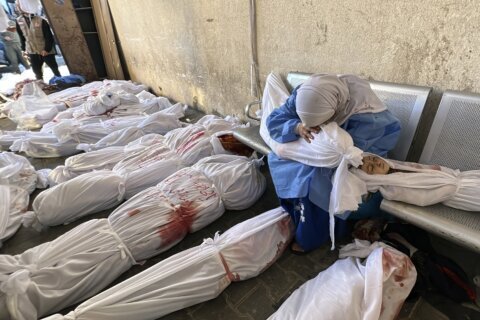JERUSALEM — Like most others places in the world, many of Israel’s hotels and tourist attractions, ranging from archaeological sites to holy places, have been empty due to the coronavirus pandemic, which has closed the country’s borders to most foreigners since March 2020.
Now, just as the borders to highly vaccinated Israel were scheduled to open, the sharp outbreak of fighting between Israel and the Hamas and Islamic Jihad groups in Gaza this month jeopardized what was supposed to be a proud moment in Israel: one of the world’s first re-openings to tourism. An announcement of Israel and Hamas agreeing to a cease-fire that began earlier on Friday — followed by reports of clashes in Jerusalem — seemed to add to the air of uncertainty over Israel’s decision to open its borders to vaccinated international tour groups.
“I don’t even know what to say,” says Susan Eshed, operations manager at Immanuel Tours, which organizes tours mainly for church groups and has seen all its bookings delayed until the fall, out of a combination of confusion about how tourism would operate under COVID-19 guidelines and the ongoing violence. “People really want to come, but it’s difficult to know when that will actually happen.”
The government will still open the borders as planned on May 23 to tour groups whose members have been vaccinated, while continuing to ban individual travelers under a unique approach that officials see as a safer way to restart tourism. But most airlines have canceled flights, citing the threat of thousands of rockets fired from Gaza that have hit Israel during the past two weeks. While Israel’s El Al and Israir airlines continue to fly in and out of the country, those in the tourism industry don’t expect many visitors to actually arrive, now that the ongoing violence is further complicating the already cumbersome extra steps required for travel during a pandemic.
“I don’t really see any tourists coming until September, October,” Eshed says. And despite Friday’s cease-fire announcement, it will take the sector, which normally makes up about 3% of the country’s annual gross domestic product, months to recover.
Retired pastor Philip McLain, who lives in South Carolina, says he plans to bring a group of about 25 people from the U.S. to Israel in October. But he adds that he already is receiving concerned emails from members of the group, asking if it will be safe to go.
“I just keep telling them that we have time, things could change well before then. I just tell them to pray,” says McClain, who has led four groups on Christian pilgrimages to the Holy Land.
[U.N.: Plight of Palestinians Reflects Global Vaccination Inequity]
“People will really need to be reassured they will not be in danger,” Eshed says. In 2014, when Israel fought a nearly two-month battle against terrorist groups and rockets from Gaza, tourism dropped 7% for the year, despite being up about 8% in the months before that violence, according to the Ministry of Tourism.
But due to a relative lull in violence during the last several years, tourism had hit record highs in 2019, before the emergence of COVID-19. That’s why re-opening the borders became a priority, especially with about 59% of Israel’s population fully vaccinated, and new daily cases hover around a dozen, according to Our World in Data.
While a growing number of countries, including member states in the European Union, have recently announced plans to open to vaccinated tourists, Israel is taking a different approach, allowing entry only to those vaccinated visitors who come with tour groups, and requiring not just virus testing upon arrival, but also a serological blood test to stamp out the possibility of forged or fake vaccine or recovery certificates.
Those rules are “an additional precaution to ensure our safety measures work,” says Israel’s tourism minister, Orit Farkash-Hacohen. One of health officials’ main goals is to track and keep out variants of the virus, for which vaccines may prove to be less effective.
“If you have groups, you can retain more control and have better surveillance,” says Hagai Levine, a professor at the Hebrew University-Hadassah Braun School of Public Health and Community Medicine in Jerusalem. “It’s part of a delicate risk management strategy.
Group travel, which usually accounts for about 30% of incoming tourism in a normal year, is also essential to getting the industry back on track, he says.
As part of the government plans to go ahead with the complex reopening plan, stations for blood tests to prove vaccination status at the airport will be added, alongside the existing virus testing stations.
“Also, in previous conflicts Israel’s borders remained open for tourists who wish to visit,” says a spokesman for the tourism ministry.
The nonprofit Birthright Israel, which offers popular educational trips to Jewish young adults from around the world, is one of the few tour operators that plans on bringing a group next week.
“This is something we have all been waiting for,” says Noa Bauer, vice president of global marketing at Birthright. “Demand is still high and we only had a small number of applicants that expressed concern thus far.”
But Birthright, which also continued to bring groups during other times of instability and violence, including in the 2000s when Palestinian suicide bombers targeted Israeli restaurants, buses and cafes, is probably in the minority, according to others in the industry.
“In the last week there have been few new requests, which suggests that people are watching the news and are wary of planning trips to Israel in the near future,” says Elisa Moed, CEO of Israel-based tour company Travelujah.
Even before the Israel-Palestinian conflict intensified earlier this month, summer tourism wasn’t expected to be all that high, with the stringent testing and group travel requirements causing people to put their plans on hold, says Ronen Nissenbaum, CEO and president of the Dan Hotels chain, which has 18 locations in Israel.
“I don’t think we will see the floodgates open until these testing requirements can be relaxed,” Nissenbaum says. In a way, the continuing effects of the pandemic have insulated the sector from the usual cascade of cancellations that come with an outbreak of violence.
“Thankfully there is little to cancel now since tourism hasn’t restarted yet,” Moed says.
More from U.S. News
Israeli-Palestinian Violence Unlikely to Deter Long-Term Ties to Gulf States
Plight of Palestinians Reflects Global Vaccination Inequity, U.N. Says
Countries Without Reported COVID-19 Cases
Violence Raises Questions Over Israel’s Tourism Plans originally appeared on usnews.com







